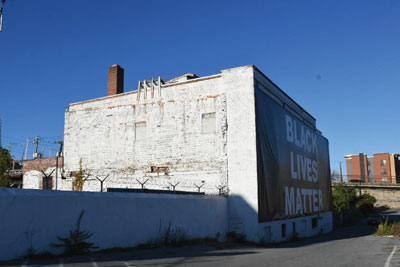
Power play reflects NIMBY attitudes around the country
By Barrington M. Salmon
The property at 3701 Benning Road in Northeast Washington, D.C. is a crumbling and forlorn sight that has continually changed hands and served many different purposes over the years. In the mid-1900s, it was the location of a slaughterhouse that was ultimately destroyed by a fire set by an arsonist. In the 1980s and 1990s, it was home to a clothing store. Most recently, it was the final stop for a nightclub that had long struggled to find a permanent place of operation.
In short, 3701 Benning Road does not have a particularly special history that distinguishes it from most other neglected lots throughout the city. To the contrary, it has at times been regarded as a blight on the neighborhood.
But that undistinguished and sometimes problematic past has not stopped local officials on ANC 7F board from attempting to designate the property as a historic landmark. Why? In a bid led by ANC 7F chair Tyrell Holcomb, the board recently claimed in an application submitted to the Historic Preservation Review Board that the property represents the last relic of the city’s most significant meat production facility. “Its significance to our heritage and to the memory of the men and women who worked there,” the application reads, “cannot be denied.”
It’s a strangely conceived and oddly timed effort that, to many in the community, smacks of opportunism and mischief-making. That’s because the board filed its application just as a major social service provider was preparing to open a reentry center for former inmates at the site. And it just so happens that Mr. Holcomb has been the most vocal opponent of having such a program in his backyard.
Critics, many of whom have said the ugly politics of NIMBYism – found nationally in communities seeking to find appropriate housing for former inmates – cannot be allowed to derail plans for a reentry program, are warning that the ANC’s gambit is nothing more than a smokescreen to delay or deter the opening of the reentry center by any means necessary. And word has it that local real estate interests, reacting to debunked assertions that the reentry center would negatively impact property values, convinced the board to take this action.
Emily Tatro, a criminal justice reform advocate with the Council for Court Excellence, pointedly summed up the board’s machinations, recently saying: “It would appear that this application has nothing to do with historic preservation… a position seeking to limit use of this site is taken to the detriment of the mostly Black men returning home to D.C. from prison, who have not had a halfway house to live in since April.”
It is far from clear whether the board will succeed in getting the property designated as a landmark, particularly since the majority of the remnants from the building’s time as slaughterhouse have long been destroyed. Moreover, newspaper records from the time show that the community viewed the slaughterhouse a harmful nuisance due to the incredible amount of pollution it caused to surrounding areas, and the additional costs associated with the sewage and harsh smells created by the factory.
Additionally, in 2015, the DC State Historic Preservation Office deemed the property “not eligible” for preservation.
What is clear however, is that the move has outraged social justice activists and other community residents who say that the board members have sunk to a new low in an effort to prevent formerly incarcerated individuals from having access to housing, job training and the other programs they will need to successfully reintegrate into society.
The matter will be the subject of evaluation by the Historic Preservation Review Board on November 15th, when the ANC 7F board and its detractors are set to present on the issue.
Efforts to open and maintain a federal reentry center in D.C. have been complicated and long. For decades, D.C. had just one reentry center. But following report after report of that facility failing to meet the needs of its clients, the program closed earlier this year.
The Bureau of Prisons then detailed a plan for a new socially responsible residential reentry center in Ward 7 and awarded CORE DC the contract to run the center.
CORE DC has made a name for itself by taking a culturally sensitive, holistic and integrated approach to reentry that includes individualized plans for each resident as well as job training and placement support. Though the reentry center operated by CORE DC was supposed to open this fall, the current opposition by Mr. Holcomb and ANC 7F has stalled that timeline.
Thousands of formerly incarcerated individuals continue to be released in D.C. each year. Providing top-notch reentry services is not only beneficial for the recently released individuals themselves, but also for the communities they live in. We know that the stability of quality reentry centers creates an environment that will keep Ward 7 safer.
Instead of hiding behind the diversion of historic site designation, we should be working with urgency to make this reentry center a reality.


Be the first to comment